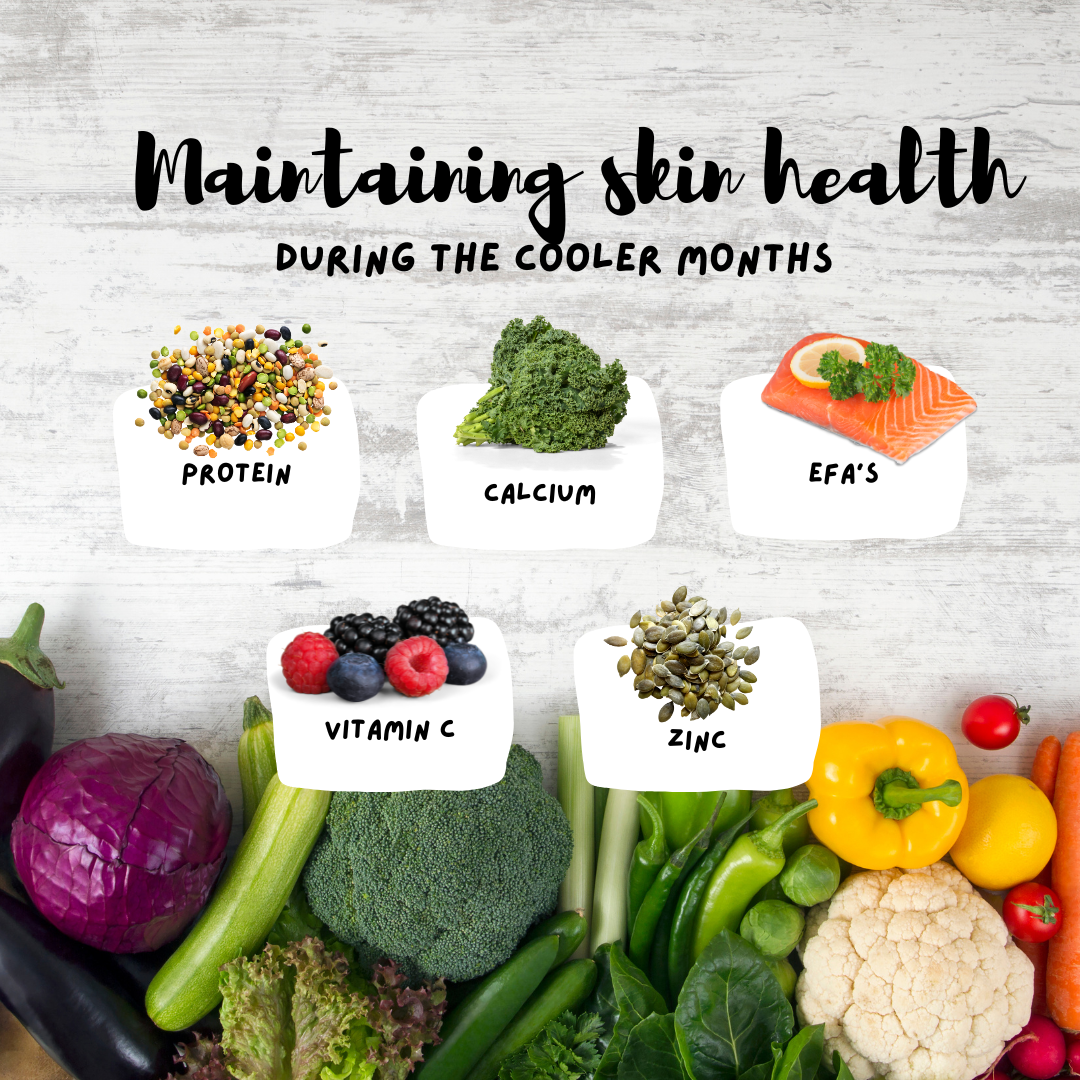Winter is a time when skin can feel extra dry, appear red and lose its usual glow! Thankfully, a helpful defence against dry skin is diet and here are some key foods to include in your diet to help maintain skin health during winter:
Protein
Food Sources: lean meat, fish, eggs, tofu, legumes, protein powder, nuts/seeds and dairy.
Protein supplies amino acids, which are required alongside zinc and copper for collagen production and healthy connective tissue formation. During winter, protein intake can slide in favour for comforting carbs. Aim to eat a source of protein at each meal and pay especially attention to protein at breakfast – if opting for a warming bowl of oats, top with 1-2 tbsp. hemp seeds, raw nuts and/or thick greek yoghurt for a boost of protein.
Calcium
Food Sources: leafy greens, natural yoghurt, tofu, broccoli, almonds, spinach, sweet potato, kale, chickpeas and tahini.
Calcium is an important mineral to defend against dry skin because calcium influences skin barrier function, which regulates water flux and retention. Vitamin D may also assist alongside calcium in a healthy functioning skin barrier and keeping skin hydration in check. This means, along with eating adequate calcium daily, continuing to get healthy sun exposure to maintain Vitamin D levels will also benefit skin.
Essential fatty acids
Food Sources: salmon, sardines, mackerel, hemp seeds, chia seeds, walnuts and flaxseeds.
Omega-3 helps to dampen down the effects of skin damage. Omega-3 as a component of cell membranes, which surrounds all cells in the body, plays a crucial role in regulating nutrients in and waste out of cells. As you can imagine, this function, assists with overall skin appearance. Aim to eat a serve of fatty fish at least 2 x weekly and include plant-based sources of omega-3 in the diet daily.
Vitamin C
Food sources: berries, citrus fruit, kiwi fruit, capsicum, tomatoes and cauliflower.
The body does not manufacture or store vitamin C so it is very important to consume this in our diets. Vitamin C assists with collagen formation. Vitamin C also exerts anti-oxidant properties.
Beta-carotene (Vitamin A)
Food Sources: carrot, kale, spinach mint, sweet potato, paw paw, peas, apricots and honey dew melon.
Food sources of beta-carotene convert to Vitamin A. Vitamin A is a fat-soluble vitamin, which also acts as an antioxidant and plays an important role in immune regulation. Vitamin A is believed to increase the strength of connections between collagen fibres and inhibit free radical and damage. Always eat beta-carotene and vitamin A rich foods alongside a source of healthy fat to help increase the absorption.
Zinc
Examples: pumpkin seeds, seafood (especially oysters), lean meat, legumes, wholegrains, nuts and seeds.
Zinc is known to protect cell membrane integrity, decrease formation of free radicals, speeds up wound healing and calm skin inflammation. As an added bonus, zinc is a beneficial mineral during winter to support immune health.
Anti-oxidants and Anti-inflammatories
Along with eating a daily selection of antioxidant rich fresh fruits and vegetables there are a few other superfoods, which can be included in the diet to boost skin health:
- Turmeric: a potent anti-inflammatory and antioxidant which plays an important role in collagen formation, wound healing and inhibiting advanced glycation end products.
- Matcha green tea: Matcha powder is more potent than green tea making each cup a hefty dose of polyphenols (antioxidants). Polyphenols are believed to lower oxidative stress and improve skin texture and integrity.
- Kombucha: kombucha is rich in beneficial bacteria, which have been shown to restore acidic skin pH, alleviate oxidative stress and improve skin barrier function.
Where does water fit in?
Keeping hydrated via adequate water intake is not only crucial for overall health, but may also benefit skin health. Water intake can dip during winter so to make it appeal more try adding a dash of cool water to hot, a few slices of fresh lemon and ginger and let it steep for a few minutes before sipping slowly. Otherwise, opting for a vegetable-based soup as a snack, starter or light meal can be a good way to boost hydration through food. Make sure to check the sodium content of soups and opt for no added salt where possible.
